Sources For Free E-Books
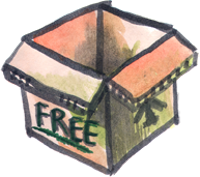
Project Gutenberg
Project Gutenberg is the oldest source of free e-books and still one of the best. It is mostly known for its Plain Text files but other formats are available as well. There are three Project Gutenberg sites that you can get books from:
Project Gutenberg at http://www.gutenberg.org/wiki/Main_Page
Project Gutenberg Australia at http://gutenberg.net.au/
Project Gutenberg Canada at http://www.gutenberg.ca/
There are other affiliated sites but any books they provide should also be available at the main site.
The reason Project Gutenberg Australia is different is that copyright laws in Australia are different than in the United States so they can host titles that the United States cannot. (There are also some titles that are in the public domain in the U.S. but still under copyright in Australia).
The website explains, "As a general rule the works of authors who died before 1955 are in the public domain in Australia. Works by George Orwell (died 1950), Virginia Woolf (died 1941), and James Joyce (died 1941), just to name a few authors, are in the public domain in Australia.
"Of course, works which are in the public domain in Australia may remain copyrighted in other Countries, even for several decades. People may not download, or read online, such works if they are in a country where they are still under copyright. That still leaves a lot of readers out there to enjoy etexts of some of the greatest literary works of the twentieth century."
Project Gutenberg Canada is in a similar situation to its Australian sister site. Canadian copyright law puts books in the public domain 50 years after the author's death. Australia used to do that, but now is a life + 70 country, except for books where the author died before 1955. Canada is under some pressure to change its copyright laws, but for now Canada can host more recent books than Australia can.
This is a typical book listing from the main website showing the formats that are available for the Jules Verne book Les Cinq Cents Millions De La Bégum (The Begum's Fortune):
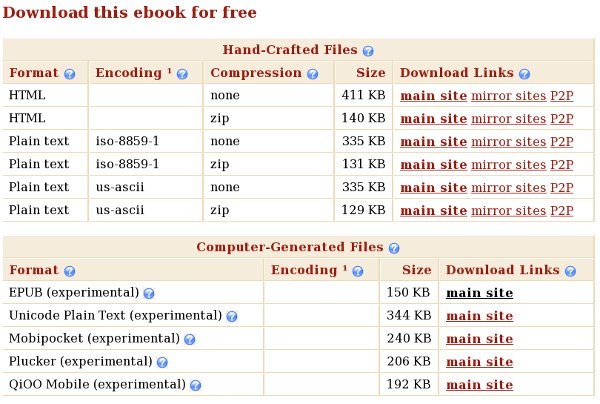
Encoding is the character set used for the Plain Text file. Nearly all books have a us-ascii version. Books in languages other than English will in addition have an iso-8859 version or a UTF-8 version. These encodings allow for things like accents and other diacritical marks. As the site explains:
"Plain text files often come in more than one encoding. us-ascii encoding is supported on virtually any device but has a very limited choice of characters. It is not suitable for any language except English. iso-8859-1 (also known as Latin1) is supported on any Windows-class machine or better. It is suitable for most Western European languages. utf-8 is suitable for any language but needs a display program that knows utf-8 and you have to install appropriate fonts for the language you are trying to display."
The HTML version is suitable for reading online and may or may not have illustrations. The EPUB version will be generated from the HTML version. EPUBs from Project Gutenberg may or may not have illustrations, but they are some of the highest quality EPUBs available.
Project Gutenberg has many titles to offer to children old enough to appreciate books without pictures. These include all the Oz books, Sherlock Holmes, all of Jules Verne, Alice in Wonderland, classic science fiction from E.E. Smith, Stanley G. Weinbaum, and many others, plus juvenile novels like the Tom Swift books, The Girl Aviators series, and much more.
Students and teachers of History will find that Project Gutenberg has much to offer as well.
The Internet Archive
The Internet Archive is a site devoted to preserving the public domain. In addition to books they have movies, music, and even some software that is in the public domain. There are over a million and a half e-books available from this site. The URL for e-books is:
http://www.archive.org/details/texts
Internet Archive books are created by scanning page images, including the covers of the books. When you read one of them the visual experience is very much like reading the original book. The website lets you read the book online in "flipbook" format, which is very much like paging through the original book:
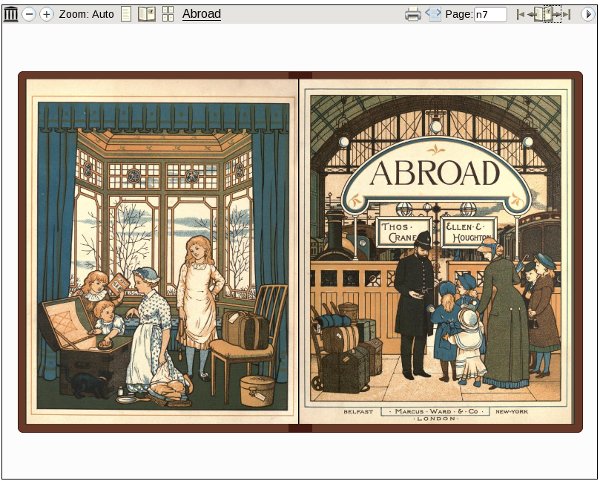
The formats offered by IA are PDF, Black and White PDF (for some of the more colorful books, to create a smaller file), DjVu, and EPUB. DjVu offers color pages with smaller file sizes than either of the PDF formats. EPUB files from IA are at the moment not the best quality, but over time this should improve. Right now they combine badly proofread text with only a few illustrations.
There is a Children's Book Collection at the Internet Archive at this URL:
http://www.archive.org/details/iacl
Quite a few of the books are from the 1800's and more of interest to children's book collectors than actual children, but you can find the Oz books, books by Edgar Rice Burroughs (Tarzan), Jules Verne, Andrew Lang's Fairy Books, The Wind In The Willows, etc. all with illustrations.
The Internet Archive is one of the few places you can download public domain comic books, although there aren't many and most are in the .cbr format instead of .cbz.
The simplest way to find the books you want from the Internet Archive is to use the Book Server page at this URL:
http://www.archive.org/bookserver
Just type in author, title or subject words in the text field on this page and you'll get a list of all the titles available and the formats they can be had in:
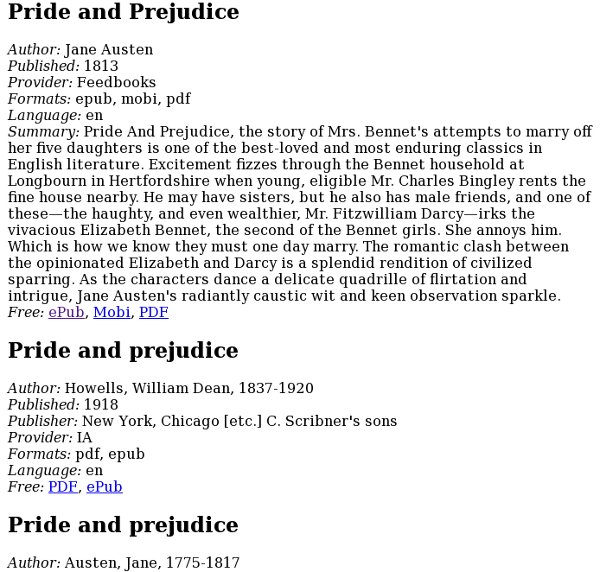
This page will show results not just for the Internet Archive but also for Feedbooks and other sources.
Feedbooks
Feedbooks offers public domain titles from Project Gutenberg converted from Plain Text to PDF format. This gives them nicer fonts, fancy chapter headings, bold and italicized text where needed, and introductory material usually from Wikipedia. They also have some original books of their own for download. They are located at:
The Rural Design Collective
The Rural Design Collective (@rdcHQ) is a not-for-profit professional mentoring organization which furthers the education and experience of residents of rural Southern Coastal Oregon who are interested in working with web and/or media technology by involving them in real development projects. They devote a portion of their program to continued exploration of technology surrounding digital books. In 2009, they built an interface for approximately 2000 digital books using a subset from the Internet Archive Children's Library. The Internet Archive Bookreader was modified to view the books online in a single page format to enhance functionality on OLPC XO gen-1 computers.
A web demonstration of that project is available at: http://www.ruraldesigncollective.org/lab/ui/
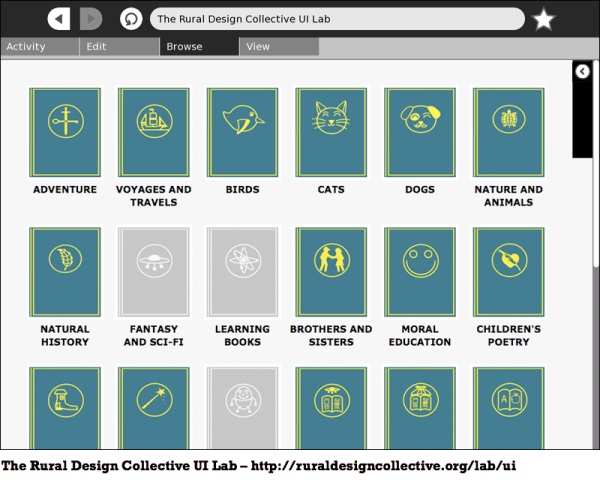
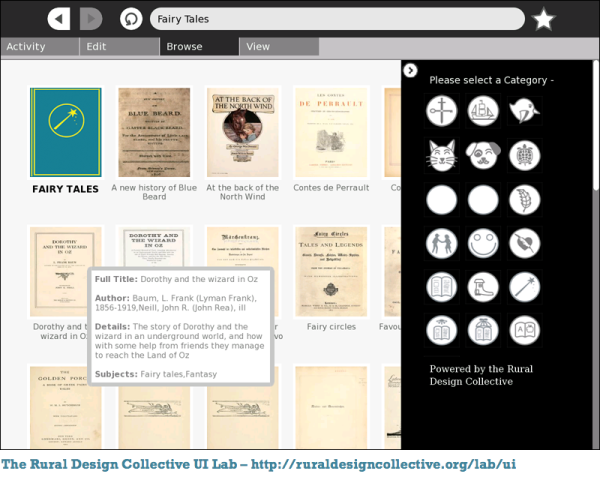
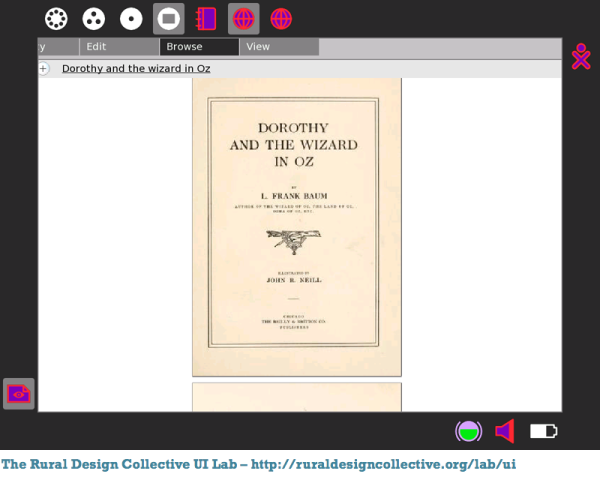
ManyBooks.net
ManyBooks.net is located at this URL:
They offer over 27,000 titles, mostly converted from Project Gutenberg Plain Text files. They offer several formats for each title, including PDF, large print PDF, EPUB, Plain Text and RTF. Their PDFs are different from Feedbooks PDFs because they generally include a book cover image (but no other illustrations) at the beginning of the document.
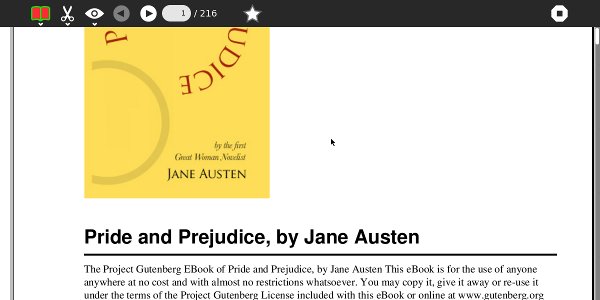
The Baen Free Library
The Baen Free Library is different from the rest of these sites because it deals with titles that are still copyrighted. Baen Books gives away free e-book downloads of some of their titles, with the author's permission, to encourage sales of the printed books they publish.
Baen publishes science fiction titles, including books by James P. Hogan, Larry Niven, Jerry Pournelle, and many other well known authors. They offer the books in several formats, but the closest thing to an open format they offer is Rich Text Format. You can load this into your favorite word processor, but a word processor is not an e-book reader. Your best options with these titles are to use Open Office to convert the RTF to a PDF, or to use an e-book reader like Read Etexts that can convert an RTF to a Plain Text file.
Most of these books are suitable for younger readers and are much more current than anything in the public domain.
free literature
This site contains links to over 600 sites that are sources of free e-books in many languages.





